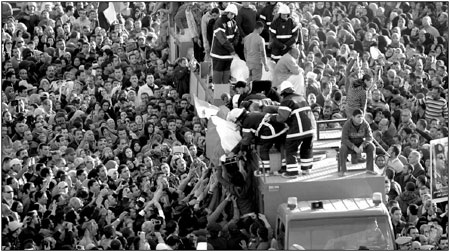Egypt arrests ex-PM after major bombing
Egyptian police arrested ousted Islamist president Mohammed Morsi's former prime minister on Tuesday as tensions rose after a major car-bomb attack on a police building killed 15 people.
The interior ministry said ex-prime minister Hisham Qandil, who is facing jail after being convicted of failing to respect a court ruling while in office, was arrested in the desert outside Cairo with a "smuggler, attempting to escape to Sudan".
An unpopular prime minister who struggled to right a dire economy, Qandil has kept a relatively low profile since the military overthrew Morsi in July.
He represented an alliance of pro-Morsi Islamist groups in meetings with European mediators who tried to defuse tensions with the military-installed government.
Those efforts failed in August, with the police launching a crackdown that killed more than 1,000 people in street clashes.
In April, while still in office, Qandil was sentenced to a year in prison for not carrying out a ruling to renationalize a company that had been privatized in 1996. An appeals court upheld the sentence in September.
Qandil's arrest followed an early-morning car bombing outside the police headquarters in the Nile Delta city of Mansoura that killed 15 people, including 12 policemen.
Jihadis 'responsible'
Ansar Beit al-Maqdis, a Sinai-based jihadi group, claimed responsibility late on Tuesday for the deadly bombing, state-run Ahram online reported.
In a statement, the group said it targeted army and police personnel. It added that the attack was carried out by a person who drove a car bomb and that more details of the powerful explosion will be revealed.
Ansar Beit al-Maqdis has already claimed responsibility for several militant attacks in the country, including a bombing near an army intelligence building in the Suez Canal city of Ismailia and a failed attempt to assassinate Interior Minister Mohammed Ibrahim.
The massive explosion on Tuesday, which the country's military-installed authorities had suggested was carried out by Morsi's Muslim Brotherhood, was one of the deadliest since the Islamist leader's ouster, which has bitterly polarized the country.
The Muslim Brotherhood condemned the bombing "in the strongest possible terms".
Analysts had said the attack was likely the work of more radical Islamists, who have carried out a string of similar attacks in the Sinai Peninsula targeting security forces.
Investigators said they suspected a suicide bomber rammed a car loaded with powerful explosives through barriers surrounding the building.
The explosion peeled off part of the building's facade and could be felt up to 20 km away.
Casualties were rushed to a hospital, where one witness said the blast had sent him flying through the air.
"I heard a massive explosion behind me. I flew through glass and wreckage and then lost consciousness," he said from his stretcher, his head swathed in bandages.
Hours after the bombing, Prime Minister Hazem Beblawi labeled the Brotherhood a "terrorist" group, but did not blame the organization for the blast.
Shadi Hamid, research director at the Brookings Doha Center, said the latest attack indicated the insurgency was intensifying.
"This is a more sophisticated attack than previous ones. It could be a sign of things to come. ... The insurgency in Sinai is becoming emboldened and extending attacks outside the Sinai," Hamid said.
AFP-Xinhua
|
Mourners at a funeral surge toward a vehicle carrying the bodies during the service for police officers and people killed in a car bomb explosion in Egypt's Nile Delta city of Mansoura on Tuesday. The attack killed 15 people, including 12 policemen, officials said. Mohamed Abd El Ghany / Reuters |
(China Daily 12/26/2013 page11)









